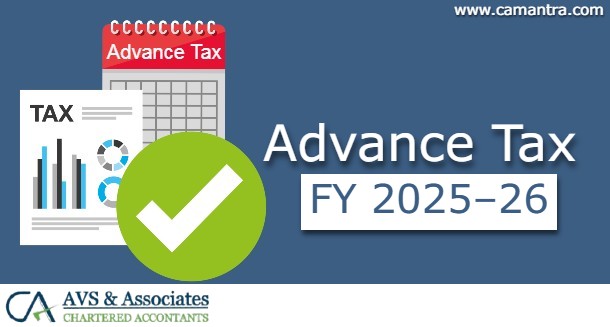Advance tax is an essential part of the Indian tax system, ensuring that income tax is collected in a timely and phased manner throughout the year. Often referred to as the “pay-as-you-earn” method, it means taxpayers—both individuals and businesses—need to pay their income tax in instalments during the financial year instead of waiting until year-end.
In this blog, we’ll cover who needs to pay advance tax, due dates, how to calculate it, who is exempt, and the penalties for missing deadlines—based on the latest rules for FY 2025–26 (AY 2026–27).
Who Needs to Pay Advance Tax?
You need to pay advance tax if your total tax liability for the FY, after accounting for TDS is more than INR 10,000. This applies to:
- Salaried individuals
- Freelancers and professionals
- Business owners
- Partners in firms
Advance Tax Due Dates for FY 2025–26
For most taxpayers, advance tax is paid in 4 instalments as given below table:
| Instalment | Due Date | Tax to Be Paid |
| 1st | 15 June 2025 | 15% of total estimated tax |
| 2nd | 15 Sept 2025 | 45% of total tax (cumulative) |
| 3rd | 15 Dec 2025 | 75% of total tax (cumulative) |
| 4th | 15 Mar 2026 | 100% of total tax |
Taxpayers opting for the presumptive taxation scheme u/s 44AD or 44ADA need to pay their entire advance tax in a single instalment by 15th March of the FY (or at the latest, by 31st March).
How to Calculate Advance Tax
Calculating advance tax may sound complicated, but it’s actually straightforward if you break it down. Here’s a step-by-step approach to help you figure out how much you need to pay:
- As a first step estimate your total income for the FY, including earnings from salary, business, capital gains, and any other sources.
- Next, reduce this amount by claiming eligible deductions u/s like 80C, 80D, and others to calculate your net taxable income.
- Calculate the tax as per applicable slab rates, including cess.
- Subtract TDS and any previous advance tax paid.
- Finally, pay the balance tax amount in instalments according to the prescribed advance tax due dates.
Using the current year’s estimated income gives more accurate results than relying on last year’s figures.
New Update: TDS on Partner Payments (Section 194T)
Starting 1 April 2025, partnership firms must deduct 10% TDS on payments made to partners (salary, interest on capital, bonus, etc.) if they exceed INR 20,000 in a year.
This helps reduce the advance tax burden on partners, as TDS will already be credited against their PAN.
Who Is Exempt from Advance Tax?
Not everyone is required to pay advance tax. The Income Tax Act provides certain exemptions based on your income level and type. You’re exempt from paying advance pay advance tax if you fall under any of the below described categories:
- Your total tax liability for the year is INR 10,000 or less
- You are a senior citizen (aged 60 or above) and don’t earn income from business or profession
- You have opted for the presumptive taxation scheme u/s 44AD or 44ADA and have paid the full tax amount by 15th March.
Penalties for Late or Non-Payment
Missing advance tax deadlines or underpaying can lead to additional interest charges. If you miss your advance tax deadlines or underpay, the IT Department may charge interest under these provisions:
- Section 234B – Interest @1% per month if you have not paid at least 90% of your total tax liability by 31st March.
- Section 234C – Interest @1% per month for any delay or shortfall in quarterly instalments.
These charges can increase your tax burden, so it’s wise to stay on schedule with your payments.
Final Thoughts
Advance tax might seem complex, but it’s actually a great way to stay on top of your finances and avoid a year-end crunch. By estimating your income and paying in stages, you reduce the burden and stay compliant.
Whether you’re self-employed, salaried, or part of a partnership, review your income regularly and make timely payments. If needed, consult a tax expert to ensure you calculate and pay the right amount.

